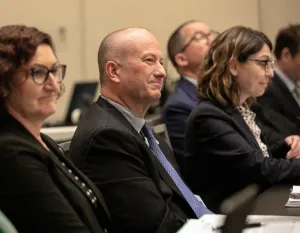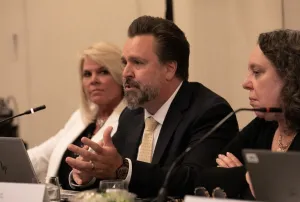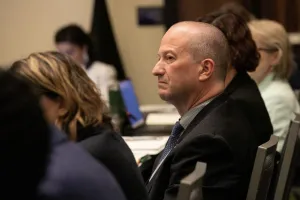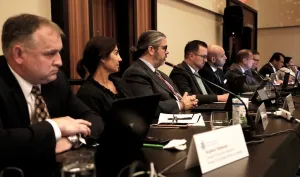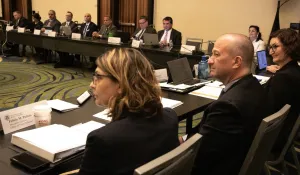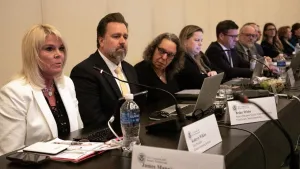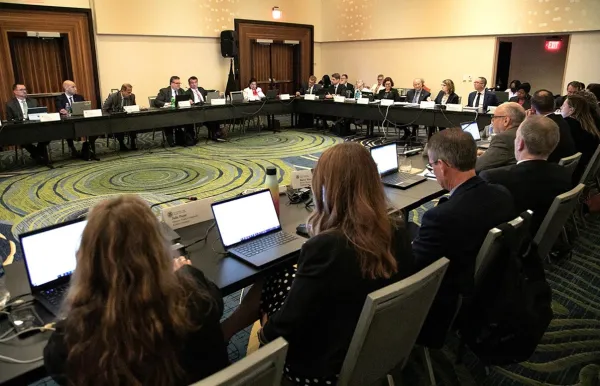By Marcy Mason
Moving forward with U.S. Customs and Border Protection’s trade modernization initiative was the central focus when the Commercial Customs Operations Advisory Committee, known as COAC, met in Arlington, Virginia, on June 14. The meeting marked the conclusion of the 21st Century Customs Framework Task Force, which was created in 2021 to facilitate industry-government discussion on trade modernization priorities. CBP’s 21st Century Customs Framework is an initiative that was launched in March 2019 to identify solutions to current and future trade challenges and modernization barriers.
“As today’s meeting marks the conclusion of our COAC consultations on the 21st Century Customs Framework legislative discussion drafts and the industry-identified proposals, I want to thank the members of the 21CCF Task Force for their engagement and insight over the years,” said CBP’s Senior Official Performing the Duties of Commissioner Troy A. Miller, who hosted the proceedings. “We look forward to continuing our engagement on these and other recommendations as new modernization ideas are formulated and Congress considers customs legislation.”
Tom West, the U.S. Department of Treasury’s deputy assistant secretary for tax policy, echoed Miller’s sentiments. “It’s galvanizing to see the final recommendations of the 21CCF Task Force after countless hours and COAC meetings. So much time has been dedicated both online and in person to these discussions by public stakeholders and government officials,” said West.
“As most of you know, in many countries around the world, the idea of government officials speaking in consultation with the private sector about changes to customs policies and process is unheard of, even frowned upon in some places,” said West. “But fortunately, in the U.S., we have a long tradition of public-private dialogue when it comes to these types of historic changes. The work of the 21CCF Task Force and the E-commerce Task Force demonstrates the value of working together.”
Tasha Reed Hippolyte, deputy assistant secretary for trade and economic security for the U.S. Department of Homeland Security, also had words of praise. “COAC has had a long and productive history of collaboration and I want to emphasize the critical value that I see in the public-private partnership. The COAC has consistently played a role in forming the Department’s priorities on important trade customs matters,” said Reed Hippolyte. “COAC’s feedback, the recommendations, are essential for DHS to continue advancing its mission. Your work provides us with valuable insight into the ever-changing trade environment and allows us to make better informed decisions.”
In his opening remarks, Miller gave examples of how collaboration has led to success. “We just concluded two operations targeting fentanyl smuggling on the southwest border, which led to more than 250 arrests and the seizure of more than 10,000 pounds of fentanyl,” said Miller. “Collaboration with other law enforcement agencies is key to this kind of success, and CBP is now conducting a new enforcement operation focused on the kinds of substances that transnational criminal organizations need to traffic fentanyl—things like pill presses and precursor chemicals.”
Miller also spoke about how collaboration will be important as CBP’s cargo processing system, the Automated Commercial Environment, or ACE, evolves into ACE 2.0. “The goal in developing ACE 2.0 is to provide CBP and partner government agencies with better quality data much earlier in the supply chain, often in near real time, from traditional as well as non-traditional actors,” said Miller. “This will vastly increase supply chain visibility as products make their way to the U.S. border, resulting in faster government responses with earlier determinations on cargo.”
But Miller noted that “CBP needs the authorization and funding to proceed with the proposed acquisition of ACE 2.0 and begin development, which we expect to take place no sooner than 2025. Once we receive authorization and funding, we will certainly ramp up engagement with COAC and our trade stakeholders,” said Miller, “In the meantime, we are testing the feasibility of some aspects of ACE 2.0 through Silicon Valley Innovation Program projects. In August 2023, CBP will test the first two projects that will connect CBP with trade users. In 2024, CBP will conduct another Silicon Valley Innovation Program project to test the ability to transmit data to partner government agencies, which will prove the viability of an upgraded single window.”
Miller gave other updates. “For the broker community, this was a significant week,” he said. “On June 12, DHS Secretary Mayorkas signed the Continuing Education for Licensed Customs Brokers Final Rule. The rule amends CBP regulations that require continuing education for individual customs broker license holders and establishes a framework for administering the requirement. While the final rule will be effective 30 days after publication in the Federal Register, to allow time for full implementation of the new requirement, CBP will reduce the number of continuing education credits for the triennial period beginning Feb. 1, 2024.” Miller further explained that CBP will publish a notice in the Federal Register announcing the number of required credits and the date qualified continuing broker education courses will be available.
Miller also spoke about CBP’s upcoming Green Trade Innovation and Incentives Forum that will be held in-person and virtually on July 11 at the U.S. Patent and Trademark Office in Alexandria, Virginia. “This will be a great opportunity for members of the trade community, academia, civil society, government and others interested in green trade to share ideas,” said Miller. Registration for the forum is online at cbp.gov until July 5, or until capacity is reached.
Another important announcement Miller made was about the COAC 17th term application process. “We are preparing for COAC’s 17th term, as the current 16th term will end in early 2024,” he said. “We issued a Federal Register Notice with a request for applicants that just recently closed. I want to thank members of the trade community who applied for COAC’s 17th term. We appreciate everyone’s interest and commitment.”
In closing, Miller reminded those attending that the World Customs Organization will be selecting its next secretary general 10 days from now. “I will join 184 heads of customs in Brussels, Belgium, to choose the next secretary general among candidates from Iraq, Togo and the United States. Many of you will recall that CBP nominated Ian Saunders, a 30-year veteran of customs and international trade, as the U.S. candidate for WCO secretary general,” said Miller. “CBP and our interagency partners are confident that Ian has the knowledge and leadership experience to propel the global customs community toward a safer, more prosperous and more inclusive future. I look forward to sharing the outcomes of the WCO Secretary General election with the COAC later this summer.”
Speaking on behalf of the COAC, trade co-chair Brian White, the senior director of customs and trade facilitation at Intel Corporation, shared how the trade advisory group’s members take great care to represent the broader trade community. “There is a considerable amount of time that’s dedicated to discussing and deliberating each one of these topics in detail. What you hear today is just the summaries of the blood, sweat, and sometimes the tears that each of us have to reach consensus on these topics that we bring back to the public meetings,” said White. “So, despite the perception of it feeling scripted, each of these topics has been debated to ensure that we are truly representing the interests of the trade sector and the trade community in these quarterly reports as well as the related recommendations we put forward.”
COAC trade co-chair Kathryn Wilkins, the vice president of logistics consulting firm Alliance Operating Services, added, “We hope to provide CBP with the tools that are needed to represent safe, secure trade, and hopefully we can all successfully participate in the charge to modernize the CBP legislation where necessary to enforce a sound, stable trade foundation.” She also said, “We want you to know and be assured that we work very diligently as a group to ensure that our thoughts and our recommendations are in line with not only the intended spirit of the legislation, but that we are advising CBP regarding commercial operations with the same vigor.”
The meeting also included updates on trade programs and COAC subcommittee work. White gave an update on the 21CCF Task Force. “Today we’re presenting our final 21st Century Customs Framework report, which includes 16 recommendations. This is the fourth comprehensive report that summarizes the engagement with CBP on the 21CCF initiative,” said White. “This collaborative effort between CBP and the Task Force as well as the focus group has truly been robust and productive. CBP really learned the detailed perspective of trade members as we talked about the challenges of what was presented to us and the legislative opportunities. The trade members also gained a better understanding of the enforcement challenges CBP is facing and how we can balance these things together to make sure that we’re enabling CBP to do a better job. These efforts and our discussions produced a number of different great ideas and the result of the three years of engagement with CBP has led to an increased mutual understanding of what’s needed in terms of legislative changes and proposals.”
White noted, however, that “the broader trade community is not in a position to endorse CBP’s modified 21st Century Customs Framework package in the absence of meaningful legislative trade facilitation measures. The legislative trade facilitation amendments are essential for the success of customs and trade modernization in the 21st century as we move forward.”
White underscored that the legislative process for trade modernization is only beginning. “Efforts to modernize the customs laws have moved beyond the COAC process, which is great,” said White. “This is what we need at this point in time. There are members of the trade community who have established coalitions to help advance those legislative trade facilitation opportunities, so that these proposals can be included in any customs modernization legislation advanced by Congress.”
Of the 24 recommendations presented and unanimously passed at the meeting, 16 pertained to the 21st Century Customs Framework, three addressed in-bond issues, four concerned CTPAT trade compliance, and one focused on export modernization.
The next public COAC meeting will be held on Sept. 20, 2023.
COAC is a 20-member advisory committee that was established by Congress in 1987. The committee provides advice and recommendations to CBP and the Department of the Treasury on the commercial operations of CBP and trade-related interdepartmental functions. Some of the issues that COAC focuses on include enhanced border and supply chain security, international efforts to harmonize customs practices and procedures, import safety, compliance and modernization and automation processes used to facilitate trade.


